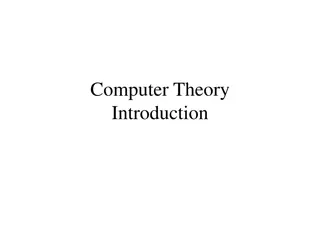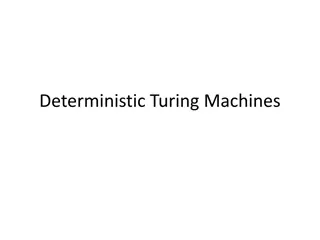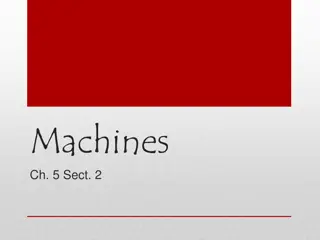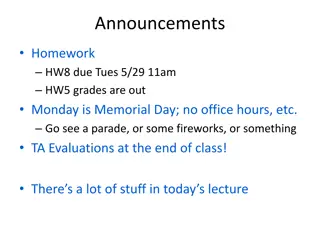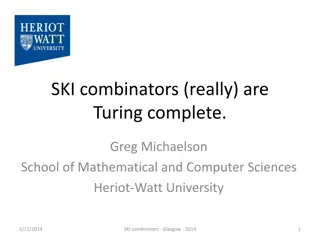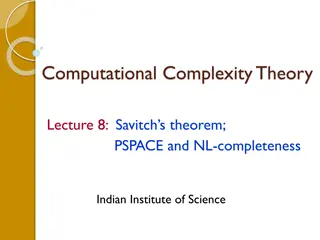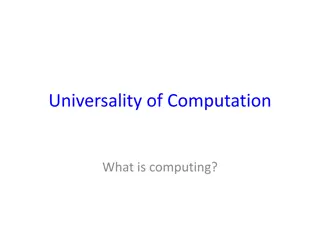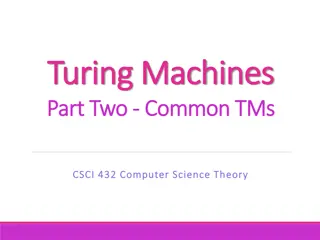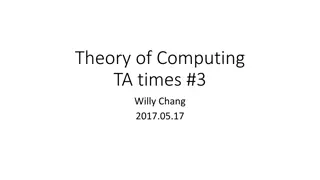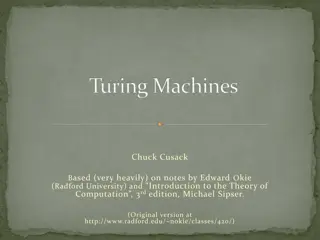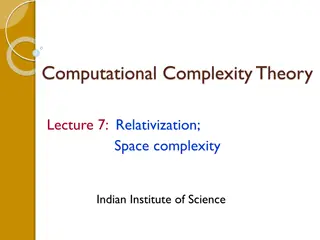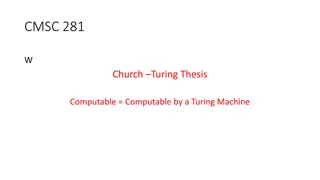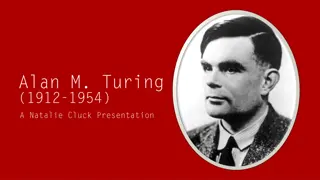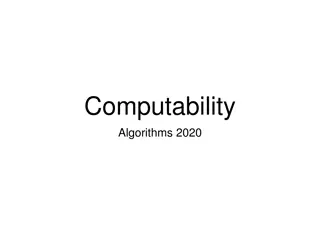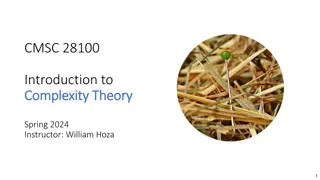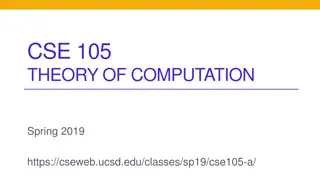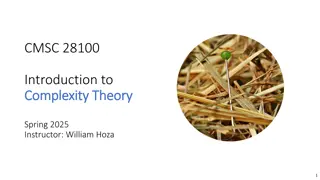Computer Theory: From Automata to Turing Machines
Dive into the world of computer theory, exploring concepts like automata, formal languages, and Turing machines. Learn about pioneers like Alan Turing and the fundamental questions in computer science, from computability to complexity.
6 views • 44 slides
Deterministic Turing Machines
Detailed explanation of Deterministic Turing Machines, their constituents, formal definition, determinism, and special statuses such as Start, Accept, Reject, and Loop. Includes visual representations and key concepts of deterministic Turing machines.
2 views • 14 slides
Machines: Work, Forces, and Efficiency
Machines play a vital role in making work easier by increasing force, distance, or changing the direction of applied force. Different types of machines like levers, pulleys, and inclined planes simplify work processes. Understanding input and output forces, as well as input and output work, is essen
7 views • 10 slides
Sizes of Infinite Sets: Insights into Countably Infinite Concepts
Explore the fascinating world of countably infinite sets through informative images and explanations from a CSE 105 lecture on the Theory of Computability. Delve into the concepts of natural numbers, strings, Turing machines, languages, and the intriguing implications of the Pigeonhole Principle. Di
3 views • 26 slides
Combinators and Computability: Unveiling the Foundations
Delve into the realm of combinatorial logic and computability through the lens of SKI combinators, exploring their Turing completeness and connection to algorithmic decision-making. Discover the historical significance of Hilbert's program, Godel's incompleteness proofs, the Church-Turing thesis, la
0 views • 65 slides
Overview of Computational Complexity Theory: Savitch's Theorem, PSPACE, and NL-Completeness
This lecture delves into Savitch's theorem, the complexity classes PSPACE and NL, and their completeness. It explores the relationship between time and space complexity, configuration graphs of Turing machines, and how non-deterministic space relates to deterministic time. The concept of configurati
2 views • 67 slides
Overview of Universality and Church-Turing Hypothesis
The universality of computation encompasses physical and mathematically defined computation, along with the concept of Turing machines and universal computers. The Church-Turing Hypothesis posits that everything computable can be computed by a Turing machine. The modern interpretation extends this t
0 views • 27 slides
Turing Machines and Busy Beaver Problem in Computer Science Theory
Delve into the realm of Turing machines, the Busy Beaver problem, palindromes, and incrementing algorithms. Explore the configurations of a Turing machine tape, the maximum number of 1s a machine can print and still halt, algorithms to determine palindromes, and tape setup for incrementing.
7 views • 10 slides
Theory of Computing TA Times #3 - Willy Chang
Explore insights on proof by construction, PDA handling, unambiguous grammar, Turing machines, and more in this TA session. Learn how to provide steady examples for proofs, avoid ambiguous grammar structures, and understand the equivalence of Turing machines with reset options.
2 views • 13 slides
Overview of Turing Machines: Introduction, Tape, and Computation
Turing Machines are fundamental in the theory of computation, capable of recognizing all computable languages. They consist of a Finite State Machine combined with an infinite tape. The tape is initialized with input on the left end, and a TM's computation can either halt by entering special accept
9 views • 29 slides
Oracle Turing Machines in Computational Complexity Theory
The lecture delves into the concept of Oracle Turing Machines and their role in proving computational complexity results, such as the limitations of diagonalization in demonstrating P vs. NP. Oracle Turing Machines are defined as Turing Machines with access to a special query tape and states for ora
1 views • 59 slides
Church-Turing Thesis and Computability with Turing Machines
The Church-Turing Thesis states that every computable function can be computed by a Turing Machine. This concept, pioneered by Turing, revolutionized the way we understand computability and algorithms. By breaking down the process into primitive operations, we can express complex algorithms in an un
5 views • 21 slides
Alan Turing: Mathematician, Cryptanalyst, and Computer Science Pioneer
Alan Turing, an English mathematician, cryptanalyst, logician, philosopher, and pioneer in computer science, played a crucial role in deciphering German Enigma encrypted messages during World War II. He is known for his work on the Turing machine, considered the foundation of theoretical computer sc
5 views • 6 slides
Hilbert's Program and Turing Machines in Mathematics
Delve into Hilbert's Program and its impact on the understanding of mathematical truth, from attempts to resolve paradoxes to the concept of formalization of effective procedures. Understand the significance of Godel's incompleteness result in the context of algorithmic decision-making. Explore the
7 views • 40 slides
Church-Turing Theses Variants
This content delves into the nuances of the Church-Turing Theses, discussing variants like CTT-original and CTT-algorithm. It explores the notions of effectively calculable functions, mechanical and finite procedures, and the sources of finiteness in computation. The discussion also covers what is c
6 views • 20 slides
Theory of Computation
In this insightful collection, delve into the groundbreaking contributions of Alan Turing, the father of computer science. Explore his pivotal role during WWII in cracking the Enigma code, his pioneering work in artificial intelligence, and the enduring legacy of his Turing Test. Witness Turing's en
4 views • 15 slides
Self-Reproducing Machines and The Recursion Theorem
Delve into the intriguing concept of self-reproducing machines, exploring how they challenge the complexity paradox through examples like factories and living organisms. Discover the Self-Reproducing TM Theorem and a computable function that highlights the feasibility of such machines. Engage with i
3 views • 14 slides
Deterministic and Non-Deterministic Data in Mechanical Engineering
Explore the concepts of deterministic and non-deterministic data in the field of mechanical engineering. Learn how to classify data, differentiate between types of physical variables, and understand the implications for experimental methods. Get insights into the application of random signals in mec
3 views • 13 slides
Introduction to Complexity Theory: Church-Turing Thesis and Turing Machines
Explore the Church-Turing Thesis and the power of Turing machines in Complexity Theory. Discuss objections, responses, and left-right-stationary Turing machines challenging the thesis, with implications and theorems examined.
2 views • 23 slides
Theory of Computation: Context-Free Languages and Turing Machines
Explore the world of context-free languages, formal grammars, Pushdown Automata, and Turing machines within the realm of theoretical computer science. Understand the closure properties of regular and context-free languages and delve into the computational power of Turing machines. Learn about langua
3 views • 24 slides
Computational Complexity and Turing Machines
Delve into the world of computational complexity and Turing Machines - exploring the resources required by algorithms to solve problems, formalized as Turing Machines with a focus on languages and processors.
7 views • 164 slides
Turing Machines and Regular Languages Explained
Explore the concepts of Turing Machines, regular expressions, Kleene's theorem, and regular languages in informatics. Understand the significance of finite automata in modeling computers and the essence of computation as elucidated by Alan Turing.
11 views • 27 slides
Turing Machines and Alan Turing's Contributions
Explore the world of Turing machines, Alan Turing's significant contributions to computer science theory, and the fundamentals of human-computer problem-solving processes. Learn about the Church-Turing thesis, the concept of tapes, states in Turing machines, and more essential elements in theoretica
1 views • 15 slides
Turing Machine: Features, Components, and Examples
Explore the concept of Turing machine, its features, components, formal definition, and an example of constructing a Turing machine for a specific language. Discover how Turing machines work and their significance in computational theory.
0 views • 68 slides
Complexity Theory and Turing Machines
Explore the fundamentals of Complexity Theory and the concept of Turing machines through Python scripts and the Church-Turing Thesis. Discover the encoding of Turing machines as strings and how they relate to modern computing devices like laptops.
0 views • 21 slides
Final Exam Review and Complexity Classes
Covering a wide array of topics including decision-making, optimization, approximation, complexity classes, oracles, Kolmogorov complexity, circuit complexity, and more. Prepare thoroughly with in-depth insights and challenges in the field of computational theory. Get ready for your final exam with
3 views • 23 slides
Turing Equivalence & Universality in CS 121 Lecture
In this CS 121 lecture, topics such as Turing equivalence, universality, and Turing machine operations are discussed. The lecture covers essential concepts like the Turing-Church Thesis, Universal Turing Machine, and the structure of Turing Machines as defined by Barak. It delves into the capabiliti
2 views • 25 slides
Turing Machines and Computability Fundamentals
Alan Turing's contributions to mathematics and computing, including the development of the Turing Machine and the concept of computability. Explore the foundation of computational theory and the implications for modern computing technology. Dive into the mechanics of the Turing Machine and its role
1 views • 63 slides
Introduction to Turing Machines and Computability
Alan Turing, a mathematician known for his groundbreaking work in statistics and code-breaking, developed the first formal definition of computation. He introduced the notion of computability by addressing the Entscheidungsproblem, which questioned the decidability of mathematical statements. Turing
4 views • 14 slides
Introduction to Turing Machines: A Powerful Abstract Concept
Turing Machines, as powerful abstract machines, can simulate modern computers albeit slowly. Their design aims to determine the decidability of problems, with undecidable problems implying computational limits. Explore TM components, transitions, and ID interpretations for computability assessment a
4 views • 21 slides
Detecting Assumptions on Deterministic Implementations of Non-deterministic Specifications
Explore the challenges of code assumptions in deterministic implementations of non-deterministic specifications. Learn about the potential risks of assuming deterministic behavior and how tools like NonDex can help in detecting and addressing such issues to improve code reliability.
0 views • 23 slides
Complexity Theory: Understanding Turing Machines and Computation Models
Explore the concepts of Turing machines, the Church-Turing thesis, and the power of computation models like multi-tape Turing machines. Delve into the possibilities and limitations of algorithms in complexity theory.
5 views • 20 slides
Theory of Computation - Spring 2019 Highlights
Dive into the world of Theory of Computation with a focus on Turing machines, recognizable and decidable sets, and the Church-Turing thesis. Explore the construction and properties of Turing machines, different levels of descriptions, and the expressive power of various machine variants. Delve into
2 views • 28 slides
Turing Machines: More Examples and Computable Functions
Today's lecture dives deeper into Turing Machines, exploring more examples and discussing computable functions. Topics include recognizing palindromes, computations involving 0s and 1s, and the future of computable functions per Barak's definition. Also covered are the operations, states, and action
0 views • 15 slides
Theory of Computation Spring 2025 Learning Goals and Turing Machine Descriptions
Explore the learning goals for Theory of Computation class in Spring 2025, covering topics such as Turing machine design and descriptions, recognizable and decidable sets, variants of Turing machines, and the Church-Turing thesis. An example Turing machine for a specific language is provided along w
0 views • 29 slides
Theory of Computation Spring 2025: Learning Goals and Turing Machines
Discover the core concepts in the Theory of Computation Spring 2025 course, including learning goals, Church-Turing thesis, decidable problems, and descriptions of Turing Machines. Explore variants of TMs, subroutines, high-level algorithm descriptions, and various models of computation.
0 views • 37 slides
Understanding Turing Machines: Basics and Examples
Explore the fundamental concepts of Turing Machines, including definitions, operations, and examples. Learn how these machines enable computation beyond finite automata and circuits in computer science.
3 views • 23 slides
Overview of Turing Machines and Hilbert's Problems in Theoretical Computer Science
Explore the power of Turing machines and delve into Hilbert's famed mathematical challenges pertaining to algorithmic solvability. Learn about the Church-Turing Thesis and its implications on computational theory. Unveil the significance of incompleteness theorems in response to Hilbert's inquiries.
1 views • 32 slides
Understanding The Importance of Decidability and Turing Machines in Computer Science Theory
Explore the fundamental concepts of decidability, Turing Machines, and their significance in Computer Science Theory. Learn how Turing Machines can implement any algorithm and the distinction between decidable, Turing recognizable, and not Turing recognizable languages.
0 views • 16 slides
Exploring Universal Turing Machines and Minecraft
Discover the simplicity and complexity of Universal Turing Machines (UTMs) as well as the world of Minecraft in this intriguing content. Learn about different UTMs designed by renowned figures like Marvin Minsky and Stephen Wolfram, and delve into the Manchester Illuminated Universal Turing Machine.
0 views • 5 slides
